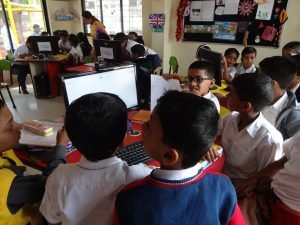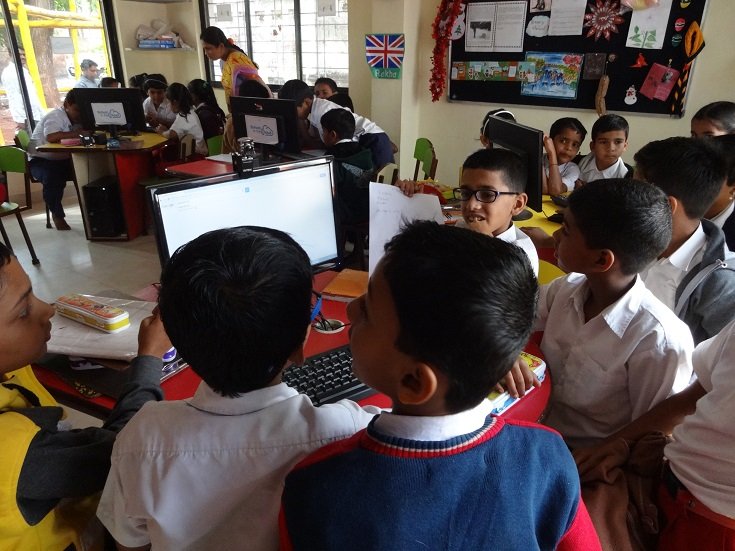Friday – 13th December 2019

Every so often something gets written, or someone posts an experience, or reports on a Granny session which talks of children searching for ‘answers’ to questions BIG and small in SOLEs as well as Granny sessions. The scope, even focus, of the questions varies depending on many things. The developmental age of the children, their competencies in terms of computers and the internet (not to mention access!), their fluency with ‘English’ (especially when material available in their native language is limited) are among the factors that play a role in determining what questions to pose and how to phrase them. It is often a ‘chicken or egg’ situation… Greater exposure leads to greater familiarity (and the ensuing development of search skills) and the other way round as well.
Some questions have relatively straightforward ‘factual’ answers. But many do not! And it is quite often the ‘issue based’ questions or those that deal with the ‘unknown’ that excite many of us. Given that a key part of our roles as Grannies is enabling children to learn about the world at large, to become good world citizens; we bring up a wide variety of topics – from climate change to ways of expression through celebrations and festivals, even individual and gender roles within families, at work, and in society.
We have often developed rather strong opinions about these issues based on our own experiences and exposure; yet we often forget that everything has a context and that a wide variety of perspectives can emerge from these varied backgrounds. And therein lies the ‘danger’. Sessions are not meant to be lessons. Their main purpose is to enable children to develop their own skills – language fluency, comprehension, critical thinking, and communication among others. So how do we achieve the balance? Providing children with a view to the world beyond their surroundings yet not imposing our own views on the children… Providing an exposure to the many happenings in the world beyond their reach yet avoiding a presentation of neatly packaged perspectives, ready for consumption…
It is often as simple as being careful about ‘where’ we start. Do we lead with a question? A genuinely open one…? Or do we start with an elaborate, detailed introduction and presentation with a clip or specific link for them to explore thrown in for good measure? Perhaps we toss in a tiny question or two at the end of the session for them to look up… If we want children to be able to search effectively (and that includes comprehension); if we want them to critically think through the ‘information’ they gather before arriving at conclusions; if we want them to communicate their thoughts logically based on evidence and rational thought; we need to start them off with the question. A Question that is sufficiently broad so that it encompasses the potential for a variety of perspectives…
We need to have them share with us what they find – before WE share OUR opinion. This debriefing process is quite possibly the most important part of the session. It is where they get to hear what several others have found… It is where they get to know about various sources of information, the links that have been accessed and explored. It is where information gradually transforms into knowledge and hopefully, with even further reflection, into wisdom.
As I have mentioned before attempting a SOLE session within a Granny session is a special kind of challenge. The lack of the facilitator’s [Granny’s] physical presence in the same location as the children, the unpredictability of the connection [it’s stability and clarity), the lack of a common language in which to interact with the children are just a few to add to the already long list of hurdles.
But there are ways around these challenges. We don’t need to ‘finish’ everything all in one session. But we do need to be careful – very careful. About ‘passing on’ our own opinions. If we are able to create an environment in which they access and consider different viewpoints AND the contexts in which these might have developed – THEN we will really be on our way…
It is for this reason that debriefing after a search activity is essential. Not to arrive at conclusions each time, but to share perspectives and possibilities… To examine the sources of the information gathered… To consider what else we might need to find out about… And to recognise that our ‘knowledge’ is based on the information we have at the moment and in a specific context. That is the beginning of real dialogue. That is what we are aiming at in Granny sessions. Because issues without a dialogue are dangerous. Let us encourage children in Granny sessions to be open – to deliberately search for different, varied viewpoints. Let us encourage them to explore alternatives to ‘our’ way of thinking and in the process become accepting of other opinions & possibilities.
As we keep seeking and searching, our worldview will expand and facilitate the directions we go in…

